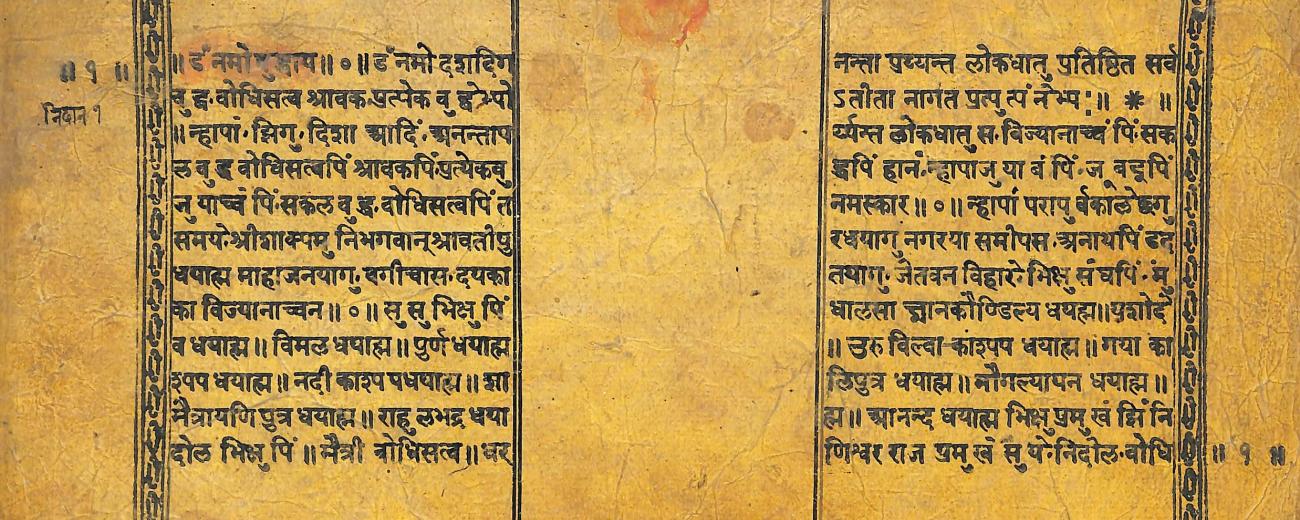
Seminar: Śrībhagavān uvāca, śrībhagavānaṃ ājñā dayakā bijyāta, and The Blessed one Said

Key information
- Date
- Time
-
10:00 am to 1:00 pm
- Venue
- Brunei Gallery
- Room
- B103
- Event type
- Lecture & Event highlights
About this event
The Buddhist Forum is kindly sponsored by the Khyentse Foundation
A Seminar on Sanskrit-Newar-English Translation: Śrībhagavān uvāca, śrībhagavānaṃ ājñā dayakā bijyāta, and The Blessed one Said. (25 February)
Participants will receive a guided tour through excerpts from Niṣṭhānanda’s first edition of his modern Newar text with glances at two Sanskrit sources the translator utilized for his text, the Lalitavistara, on the one hand, and the Nepalese-authored Bhadrakalpāvadāna, on the other. The readings will serve to provide a glance at early 20th century Newar translation practices and to familiarize readers with the very basics of modern Newar. They will be complemented by a look backwards in time at the antecedents of Niṣṭhānanda’s enterprise through a directed reading of the beginning of one of the most popular stories among Newar Buddhists throughout history, the tale of the prince with the magical jewel on his head, the Maṇicūḍāvadānoddhṛta, composed in the 19th century in classical Newar, and its Sanskrit source text. Reading materials and reference works will be provided by the instructor.
Lecture: Further, the Blessed One Said. The Lalitavistara, Niṣṭhānanda Bajrācārya, and the Emergence of Modern Newar Buddhism (24 February)
In 1914, a year in which Newar, the language Kathmandu Valley Buddhists had for centuries spoken and preserved their literature in, was still banned from public usage, the priest and storyteller Niṣṭhānanda Vajrācārya did the unimaginable: he printed a 461-double-page version of the life of the Buddha which he had compiled from Sanskrit sources and translated into the spoken Newar of his day using print technology smuggled into the country from Calcutta, and distributed the book among his friends and relatives. Newar literary historians regard this as the beginning both of modern literary Newar and modern Newar literature. This lecture will reveal the role Buddhism, a Buddhist author, and a Buddhist text played in that historical moment. It will lead listeners through the process in which Niṣṭhānanda Bajrācārya (1858-1935) collated and assembled key Newar Sanskrit texts for a comprehensive hagiography of Buddha Śākyamuni, how he gave it a new hybrid literary-vernacular Newar form with nods to both his own Sanskrit and Nepali linguistic environments, rooted it in the Kathmandu Valley on the cusp between the storytelling of his forefathers and the stirring linguistic and literary activists of the 20th century that would resist the suppression of their language and prepare the ground for the resurgence of Newar literature from the spirit of Newar religiosity.
Speaker bio
Christoph Emmrich (Ph.D. University of Heidelberg, 2004) is Associate Professor of Buddhist Studies at the University of Toronto. He engages with fields as diverse as Nepalese and Burmese Buddhism, Sanskrit, Pali, Newar, Burmese and Mon literature, and Tamil Jainism. He works with girl children, young women, and ritual specialists among the Newars in the Kathmandu Valley
(Nepal) and in Yangon, Mandalay, and Mawlamyine (Burma) studying their involvement in Buddhist practices related to marriage, coming-of-age, gender, childhood, and the writing of ritual. He has worked on canonical Theravāda and Śvetāmbara Jain pre-scholastic doctrines of time, as well as on the history of Jain literature and religious institutions in North and South Arcot, Tamil Nadu. In his work, he addresses questions of resemblance and resistance, transfer and translation, mimesis, and memory. Currently, he is leading a team, located at UofT, at the University of Virginia, and in Kathmandu, that is compiling the Newar Online Dictionary, the first electronic meta-dictionary of classical and modern Newar.
Registration
This lecture is free and open to all. The seminar (25 Febrary) is also free and open to all, but registration is necessary. Please register for tea and seminar material with Haruka Saito hs77@soas.ac.uk
For more information please contact the organiser: cl46@soas.ac.uk


